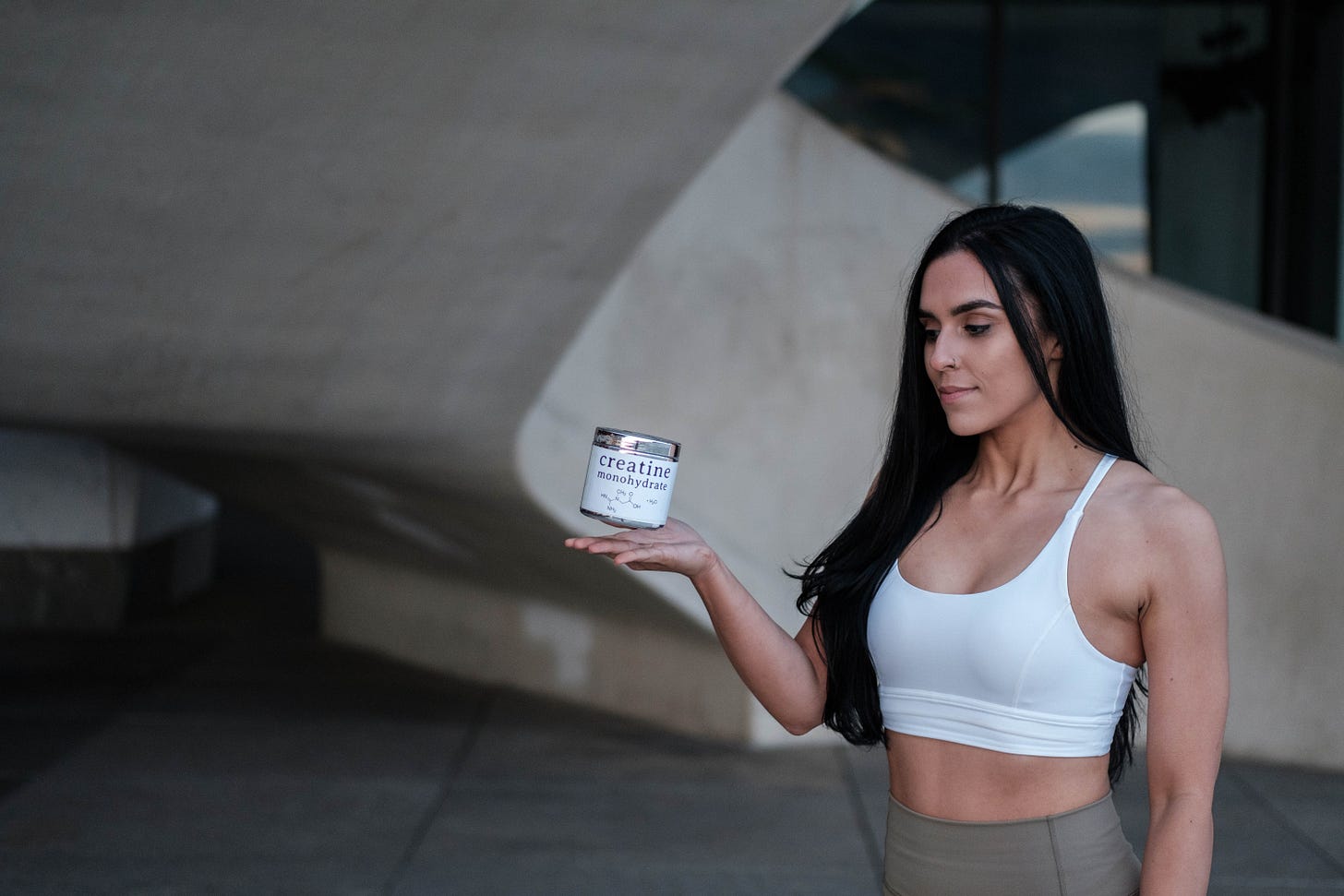You should take Creatine. Here's why.
There are hundreds of studies supporting creatine. It's effective, safe, and affordable. I believe it’s one of the very few natural supplements worth taking. Here's why.

Social media tries to make it seem like supplements are the key to success in the fitness industry — and since everyone is taking them, you should be too.
This can easily get overwhelming for anyone. Not to mention, very expensive.
While most supplements are completely unnecessary, creatine is the only supplement with hundreds of studies supporting its effectiveness to increase muscular strength and performance.
And while I think that one should always aim to max out their recommended nutrients through whole food options first, studies show that it’s actually very difficult to achieve an optimal level of creatine through diet alone.
The dosage in creatine-containing foods typically isn’t large enough to maximize creatine stores in most people — let alone, in athletes.
The typical person’s diet would provide only around 1 gram of creatine per day — which really isn’t quite enough to see the results you would get from supplementation.
And that average becomes significantly lower in vegetarian or vegan diets.
Not only does supplementing creatine seem to be far more efficient and practical — it’s also much less expensive.
For example, taking the recommended dose of creatine monohydrate, an average cost of around $1.25, would be equivalent to eating 2.5 lbs of uncooked steak. An average cost of around $38 — every day.
But let’s back up a bit.
The cells in our bodies run on energy supplied by the molecule called ATP (Adenosine Tri-phosphate).
As athletes, the production of ATP is extremely important for training intensity. When there’s a high demand for energy, ATP is broken down into two constituent parts: ADP and a phosphate molecule — allowing that energy to quickly release for muscle contraction.
However, it’s not very efficient on its own since using too much ATP at once can cause muscle cells to become acidic — leading to muscle fatigue within a matter of seconds.
In order to combat this, two things happen.
First, creatine kinase helps to keep acid levels in check by taking out hydrogen ions, and at the same time, converts ADP to the type of creatine that is already naturally found in our bodies: Creatine Phosphate.
Where the supplement of creatine comes in is by producing higher stores of creatine phosphate, and this is why long-term supplementation tends to be associated with more muscle growth.
Higher stores of creatine phosphate increases ATP production, which then indirectly improves training performance by helping to recover more efficiently and delaying muscle fatigue during repeated bouts of high-intensity training.
In short, creatine supports muscle development and great workouts.
There’s a cause and effect relationship between supplementing creatine and an increase in strength, power, and performance during brief bouts of high-intensity exercise.
And while creatine does draw more water to the muscle (giving you a tighter, fuller look) research shows it actually doesn’t cause water retention or bloating anywhere else. So don’t worry. The weight increase after starting creatine supplementation is only water weight. Not fat.
There’s also no need to load creatine or cycle off of it, since, unlike caffeine, the body won’t develop a tolerance. Instead, it only becomes effective once it collects and saturates within the muscle cells.
Finally, it’s also important to note that the benefit gained through creatine supplementation is highly individual since up to 30% of people are labeled as “non-responders.” It’s possible that age or genetic response plays a role here, but it’s also more likely explained by the initial muscle creatine content prior to supplementation.
Essentially, if your pre-supplementation creatine stores are already close to full then an additional dose is unlikely to have any effect.
That said, no negative performance effects of taking creatine have been reported to date. So essentially, self-experimenting with creatine could only positively affect your training at best or have no effect at worst.
With all the research supporting its effects, safety, and affordability, I truly believe it’s one of the very few natural supplements worth taking.
Note: This goes without saying, maybe, but I am not a doctor.




Hey, Ryan!
Thanks for the comment! The best brand to check for is a cheap Creatine Monohydrate. Specifically make sure it's Monohydrate. Personally, I go with the unflavored Nutrikey on Amazon :)
I started taking creatine about 2 months ago. Haven't noticed a huge difference but want to keep a consistent routing going and see where it takes me. Do you have a particular brand you would recommend over others?